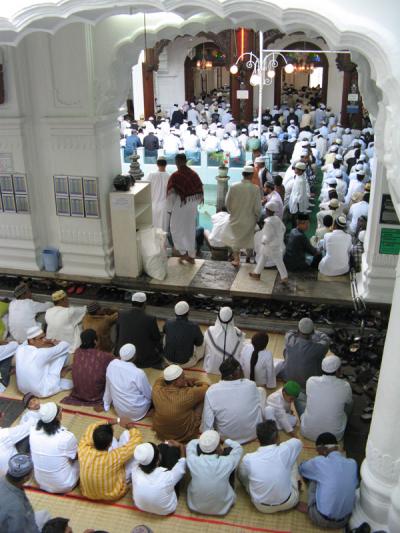The end of Ramadan marks the Eid festivity. There are two Eids. The first Eid is called Eid-ul-Fitr. It falls on the first day of shawaal, the tenth month of the Muslim year, following the month of Ramadan in which the Qur’an was revealed and which is the month of fasting.
The second is called Eid-ul-Adha (the festival of sacrifice). It falls on the tenth day of Zil-Hijjah, the last month of the Muslim year. The Islamic Eids are unique in every way. To them, there can be nothing similar in any other religion or any other socio-political system. Besides their highly spiritual and moral characteristics, they have matched qualities. Each Eid is a wholesome celebration of a remarkable achievement of the individual Muslim in the service of Allah. The first Eid comes after an entire month of ‘absolute’ fasting during the days of the month. The second Eid marks the completion of Hadj (pilgrimage) to Mecca, a course in which the Muslim handsomely demonstrates his renouncement of the mundane concerns and hearkens only to the Eternal voice of Allah.
The festival of Eid is also a thanksgiving day where the muslims assemble in a brotherly and joyful atmosphere to offer their gratitude to Allah for helping them to fulfill their spiritual obligations prior to the Eid. This form of thanksgiving is not confined to spiritual devotion and verbal expressions. It goes far beyond that to manifest itself in a handsome shape of social humanitarian spirit.
The Muslims who have completed fasting of Ramadan express their thanks to Allah by means of distributing alms among the poor and needy on the first Eid. Similarly, the Muslims who have completed the course of Hadj at Mecca, as well as those who are at home, offer their sacrifices by slaughtering oblations to be distributed among the poor and needy. The distribution of alms and oblations constitutes a mayor part of the Eids highlights. This Islamic form of combination cannot be found except in Islam.
Eid is a day of remembrance. Even in the most joyful times the Muslims make a flesh stall of the day by a plural session of worship to Allah. They pray to Allah and glorify His name to demonstrate their remembrance of His favours.
Along with that course, they remember the deceased by prayer for their souls, the needy by extending a hand of help, the grieved by showing them sympathy and consolation, the sick by cheerful visits and utterances of good wishes, the absentees by cordial greetings and sincere considerations etc… Thus the meaning of remembrance on the day transcends all limits and expands over far reaching dimensions of human life.
Each Eid is a day of victory. The individual who succeeds in securing his spiritual rights and growth receives the Eid with a victorious spirit. Those who faithfully observe the duties, which are associated with Eid are the triumphant ones.
When Muslims assemble in the congregation of Eid day, they all whole-heartedly pray for forgiveness and strength in faith. And Allah has assured those who approach Him with sincerity of His mercy and forgiveness. In that pure assembly and highly spiritual congregation any true Muslim would feel ashamed of himself before Allah to hold any enmity or ill-feelings towards his brethren.
A true Muslim would be deeply impressed by this brotherly and spiritual assembly, and would overcome hid feting if he has been exposed to any. Consequently, he would find himself moving along with others responding to the spirit of the day to purify his heart and soul.
In any case, he would forgive those who miglit have wronged him, because he himself would be praying for Allah’s forgiveness, and would do his best to acquire it. The spirit of this highly devotional assembly would teach him that if he forgives he would be forgiven. And when he forgives, the virtue of forgiveness will be mercifully exercised by Allah and widely exchanged between the Muslims. And that marks the day as a day of forgiveness.
When a Muslim establishes peace within his heart by obeying the law of Allah and leading a disciplinary life, he has certainly concluded a most sacred treaty of peace with Allah. Once a person is at peace with Allah, he is at peace with himself and, consequently, with the rest of the Universe. So when he celebrates the Eid in the right manner, he is actually celebrating the conclusion of a peace treaty between himself and Allah, and this marks the Eid as a day of Peace
Many Muslims are highly indebted to both Mr Ismed Dulloo, President of ‘Noorani Mosque of Bel Air Riviere Seche and Mr Raouf Soheea for the good organizations and salvation they have done throughout Ramadan period and the preparation for Eid-ul-Fitr for all devotees.
RELIGION: The Significance of Eid festival
- Publicité -
EN CONTINU ↻


